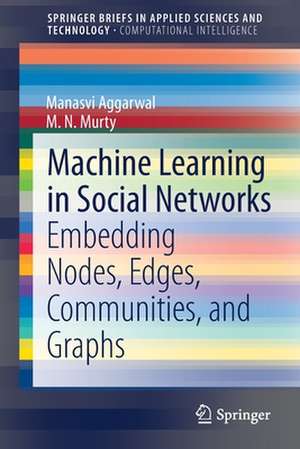Machine Learning in Social Networks: Embedding Nodes, Edges, Communities, and Graphs: SpringerBriefs in Applied Sciences and Technology
Autor Manasvi Aggarwal, M. N. Murtyen Limba Engleză Paperback – 26 noi 2020
Din seria SpringerBriefs in Applied Sciences and Technology
-
 Preț: 380.29 lei
Preț: 380.29 lei - 17%
 Preț: 360.34 lei
Preț: 360.34 lei - 20%
 Preț: 386.12 lei
Preț: 386.12 lei -
 Preț: 380.07 lei
Preț: 380.07 lei -
 Preț: 377.95 lei
Preț: 377.95 lei -
 Preț: 382.32 lei
Preț: 382.32 lei -
 Preț: 376.59 lei
Preț: 376.59 lei -
 Preț: 379.09 lei
Preț: 379.09 lei -
 Preț: 378.12 lei
Preț: 378.12 lei - 20%
 Preț: 293.83 lei
Preț: 293.83 lei -
 Preț: 344.90 lei
Preț: 344.90 lei -
 Preț: 321.36 lei
Preț: 321.36 lei -
 Preț: 264.79 lei
Preț: 264.79 lei -
 Preț: 344.90 lei
Preț: 344.90 lei -
 Preț: 356.46 lei
Preț: 356.46 lei -
 Preț: 382.95 lei
Preț: 382.95 lei -
 Preț: 355.66 lei
Preț: 355.66 lei -
 Preț: 479.67 lei
Preț: 479.67 lei -
 Preț: 415.18 lei
Preț: 415.18 lei -
 Preț: 444.52 lei
Preț: 444.52 lei - 20%
 Preț: 301.86 lei
Preț: 301.86 lei -
 Preț: 409.43 lei
Preț: 409.43 lei - 20%
 Preț: 322.17 lei
Preț: 322.17 lei -
 Preț: 355.49 lei
Preț: 355.49 lei - 15%
 Preț: 462.51 lei
Preț: 462.51 lei -
 Preț: 377.18 lei
Preț: 377.18 lei -
 Preț: 355.93 lei
Preț: 355.93 lei -
 Preț: 382.95 lei
Preț: 382.95 lei -
 Preț: 378.12 lei
Preț: 378.12 lei -
 Preț: 378.12 lei
Preț: 378.12 lei -
 Preț: 380.07 lei
Preț: 380.07 lei -
 Preț: 380.07 lei
Preț: 380.07 lei - 20%
 Preț: 326.28 lei
Preț: 326.28 lei -
 Preț: 312.68 lei
Preț: 312.68 lei -
 Preț: 356.43 lei
Preț: 356.43 lei -
 Preț: 412.30 lei
Preț: 412.30 lei - 20%
 Preț: 225.31 lei
Preț: 225.31 lei -
 Preț: 378.12 lei
Preț: 378.12 lei -
 Preț: 376.59 lei
Preț: 376.59 lei -
 Preț: 195.87 lei
Preț: 195.87 lei -
 Preț: 376.22 lei
Preț: 376.22 lei - 20%
 Preț: 324.64 lei
Preț: 324.64 lei - 20%
 Preț: 288.73 lei
Preț: 288.73 lei -
 Preț: 377.57 lei
Preț: 377.57 lei -
 Preț: 261.91 lei
Preț: 261.91 lei -
 Preț: 381.98 lei
Preț: 381.98 lei -
 Preț: 273.64 lei
Preț: 273.64 lei -
 Preț: 410.87 lei
Preț: 410.87 lei -
 Preț: 379.68 lei
Preț: 379.68 lei -
 Preț: 374.30 lei
Preț: 374.30 lei
Preț: 409.36 lei
Preț vechi: 511.71 lei
-20% Nou
Puncte Express: 614
Preț estimativ în valută:
78.36€ • 85.14$ • 65.86£
78.36€ • 85.14$ • 65.86£
Carte tipărită la comandă
Livrare economică 21 aprilie-05 mai
Preluare comenzi: 021 569.72.76
Specificații
ISBN-13: 9789813340213
ISBN-10: 9813340215
Pagini: 112
Ilustrații: XI, 112 p. 29 illus., 18 illus. in color.
Dimensiuni: 155 x 235 mm
Greutate: 0.19 kg
Ediția:1st ed. 2021
Editura: Springer Nature Singapore
Colecția Springer
Seriile SpringerBriefs in Applied Sciences and Technology, SpringerBriefs in Computational Intelligence
Locul publicării:Singapore, Singapore
ISBN-10: 9813340215
Pagini: 112
Ilustrații: XI, 112 p. 29 illus., 18 illus. in color.
Dimensiuni: 155 x 235 mm
Greutate: 0.19 kg
Ediția:1st ed. 2021
Editura: Springer Nature Singapore
Colecția Springer
Seriile SpringerBriefs in Applied Sciences and Technology, SpringerBriefs in Computational Intelligence
Locul publicării:Singapore, Singapore
Cuprins
Introduction.- Representations of Networks.- Deep Learning.- Node Representations.- Embedding Graphs .- Conclusions.
Notă biografică
M.N. Murty is currently a Professor in the Department of Computer Science and Automation at the Indian Institute of Science, Bangalore. His research interests are in the area of pattern recognition, data mining, and social network analysis.
Ms. Manasvi Aggarwal is currently pursuing her M.S. at the Indian Institute of Science, Bangalore. Her research interest is in the areas of social networks and machine learning
Ms. Manasvi Aggarwal is currently pursuing her M.S. at the Indian Institute of Science, Bangalore. Her research interest is in the areas of social networks and machine learning
Textul de pe ultima copertă
This book deals with network representation learning. It deals with embedding nodes, edges, subgraphs and graphs. There is a growing interest in understanding complex systems in different domains including health, education, agriculture and transportation. Such complex systems are analyzed by modeling, using networks that are aptly called complex networks. Networks are becoming ubiquitous as they can represent many real-world relational data, for instance, information networks, molecular structures, telecommunication networks and protein–protein interaction networks. Analysis of these networks provides advantages in many fields such as recommendation (recommending friends in a social network), biological field (deducing connections between proteins for treating new diseases) and community detection (grouping users of a social network according to their interests) by leveraging the latent information of networks. An active and important area ofcurrent interest is to come out with algorithms that learn features by embedding nodes or (sub)graphs into a vector space. These tasks come under the broad umbrella of representation learning. A representation learning model learns a mapping function that transforms the graphs' structure information to a low-/high-dimension vector space maintaining all the relevant properties.
Caracteristici
Highlights the understanding of complex systems in different domains including health, education, agriculture, and transportation Combines both conventional machine learning (ML) and deep learning (DL) techniques to understand complex systems Presents neural networks and Deep Learning (DL) techniques useful in network embedding
